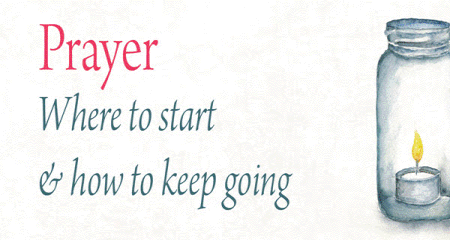


PART FOUR
What is prayer and
how do I start?
How do I build prayer
into everyday life?
'Most of us have routines that shape the day.
One of the ways of developing a life of prayer
is to weave times of prayer into these
existing rhythms and routines.
If we attend to some simple spiritual
disciplines and rhythms to shape our day,
we are also more likely to
maintain good mental health.'
Each point in the day lends itself to
a different sort of praying:
First thing in the morning
When you get up in the morning
and clean your teeth, or when you jump in the shower.
Or when you open the curtains
for the first time - use this as
an opportunity to welcome the new day.
Dedicate the day to God,
asking that you will receive
the sustenance you need.
This kind of prayer is sometimes called
a consecration of the day to God.
At mealtimes
Eating is still one of the main routines
that shape a day.
When you sit down to eat, say a prayer of thanksgiving
for your food. This is a very basic sort of prayer.
It enables us not just to give thanks for the food
in front of us, but for all those whose
lives are connected with ours,
and for all the ways God provides for us.
I might want to give thanks for those who plant
and grow and pick and transport and stack and sell
the food that ends up on my plate.
This kind of prayer is called thanksgiving.
It is primarily for the food and those whose labour
has provided it. But it can also be a brief opportunity
to give thanks to God for all the things that sustain life,
not least God's own unending grace and goodness.
It's worth remembering that the word Eucharist
(one of the names Christians have for Holy Communion)
means thanksgiving.
The most basic act of worship in the church is a meal.
And it is a thank you meal.
As you exercise
When you take your daily walk
(or run or cycle) you are likely to be on your own.
Why not use this as an opportunity to pray for
others as well as yourself.
Perhaps list in your mind the people you are
concerned about and the other things
that are closest to your heart.
This kind of prayer is usually called intercession.
It is that prayer when we bring to God
the people and things that are on our hearts.
At the end of the day
At the end of the day you could say
the ancient office of Night Prayer (or Compline).
This is a service of quiet reflection for the end of the day,
deriving its name from the Latin word meaning completion.
It includes an opportunity to think over the day,
what is sometimes called
an examination of conscience.
We bring to God what has happened in the day.
The things that have gone well
and the things that have gone wrong.
The things we should have said and done
as well as the wrong things we ended up
saying and doing.
This kind of prayer is called confession.
We acknowledge our need of God,
our sinfulness, and we cry out for God's
abundant mercy and goodness.
We also finish the day as we started:
thanking God for the blessings of the day;
and praying for rest and safety through the night.
Not all these things will work for everyone.
Some things that work one day,
won't work so well the next.
Find the way of praying that is right for you,
and then build on it,
trying other new things from time to time.
And perhaps speak to friends about
how it is going and what works for them.
"Love to pray.
Feel often during the day
the need for prayer,
and take trouble to pray.
If you want to pray better,
you must pray more."
Mother Teresa of Calcutta,
In the Silence of The Heart
Think about the rhythms and routines
of your daily life.s
Make time for God by discerning where
in each day are your times and places for prayer.
Try giving thanks before a meal -
with others or on your own.
Keep it short and simple,
such as
"O Lord, bless this food to our use
and us in your service,
and keep us ever mindful of
the needs of others.
Amen."
Time to Pray
from the Church of England
offers a simple service of
Prayer During the Day
and Night Prayer
you could use as your basic diet
of daily prayer.
There's a free app with audio,
a booklet, and you can
also follow it online.
Prayer
Save us, O Lord, while waking,
and guard us while sleeping,
that awake we may watch with Christ
and asleep may rest in peace.
Amen.
(Common Worship night prayer)
The material by Stephen Cottrell is taken from
the illustrated Church House Publishing book
and eBook Prayer:
Where to Start and How to Keep Going.
The text is © Stephen Cottrell 2020
and includes material adapted from How to Pray,
which is © Stephen Cottrell 1998, 2003, 2010
and is used here with permission of
the author and publishers.
Prayers from Common Worship volumes
and New Patterns for Worship are
copyright ©The Archbishops' Council
2000-2008 and 2002 respectively and are
published by Church House Publishing.
Used here with permission.
All rights reserved.
Scripture quotations are from the
New Revised Standard Version of the Bible,
Anglicized Edition, copyright © 1989, 1995
by the Division of Christian Education
of the National Council of
the Churches of Christ in the USA.
Used by permission. All rights reserved.
Illustrations are by www.penguinboy.net
Copyright ©2021. The Church of England. All rights reserved.